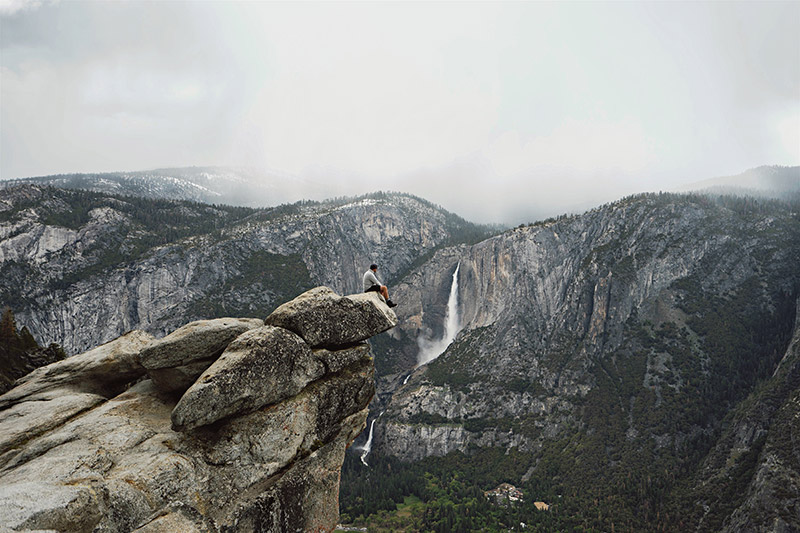
(Image)
“How do I deal with disillusionment as I grow older? Disillusionment in the sense that I now perceive the world to be a rather cold and harsh place, filled with people who only mind their own interests.
This is in stark contrast with what I used to see the world as: a place with immense potential for good, lots of opportunities, negligible discrimination, etc. People used to be warm but now human interactions are diminishing. The hope and happiness that I used to have just by thinking about the world have turned to cynicism and depression.”
Recently, I saw this question on Quora and decided to answer it here.
I can understand feeling disillusioned as you grow older. For the past few years, I’ve been disillusioned with the blogging industry. I started creating websites in 1998 and started PE in 2008, and back then people created websites out of the love of creating and giving value to others.
But today, blogging is all about profiteering, creating email funnels, and maximizing sales. While we should definitely earn money for our work, people’s focus today seems to be to profit as the primary goal, rather than to give value.
I’ve been disillusioned with online negativity. Sometimes I don’t post anything as I find it easier to hide rather than to deal with people’s snarkiness and unhappiness. Rather than shame and create fear, we can do with more love and positivity. Anger and sarcasm seem to be everywhere these days and it’s depressing to see people attacking one after another online.
I’ve also been really disillusioned with society.
- The modern world creates so much waste today. Did you know that we create 3.5 million tons of solid waste daily and billions of pounds of plastic end up in the ocean per year, ruining marine ecosystems?[1][2][3] Instead of fixing these issues, capitalistic economies continue to create waste on a massive level.
- Human rights are lacking even in supposedly “developed” places. Human trafficking, child trafficking, and child prostitution remain serious issues. 1.2 million children are trafficked each year while 21 million victims are trapped in modern-day slavery.[4][5]
- There are still so many people trapped in poverty. Nearly 1/2 of the world’s population live on less than $2.50 a day even though our world is richer than it has ever been.[6]
- In almost every country I’ve been to, there are always very poor people struggling to make ends meet. To me, this means that somewhere along the way, something has failed in the country’s governance for people to end up this way.
- When you dig into society’s structures, many of them exist to serve the super-rich, not humanity.
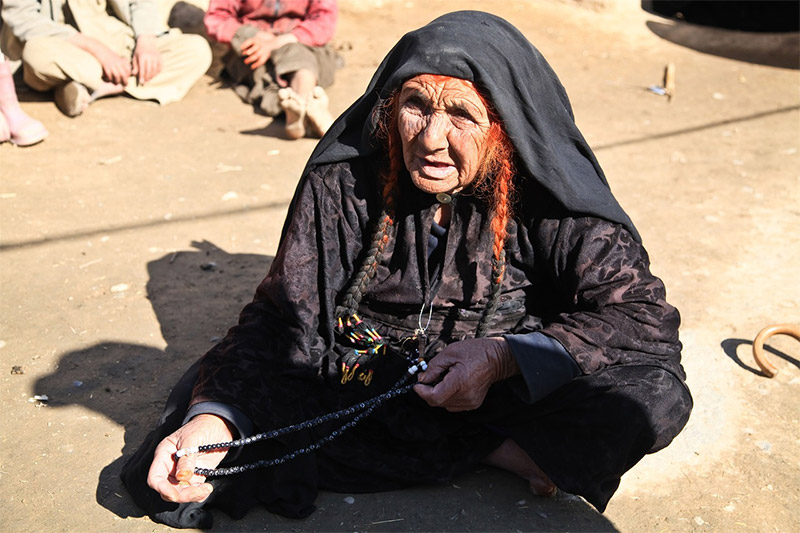
An old woman beggar in Afghanistan (Image)
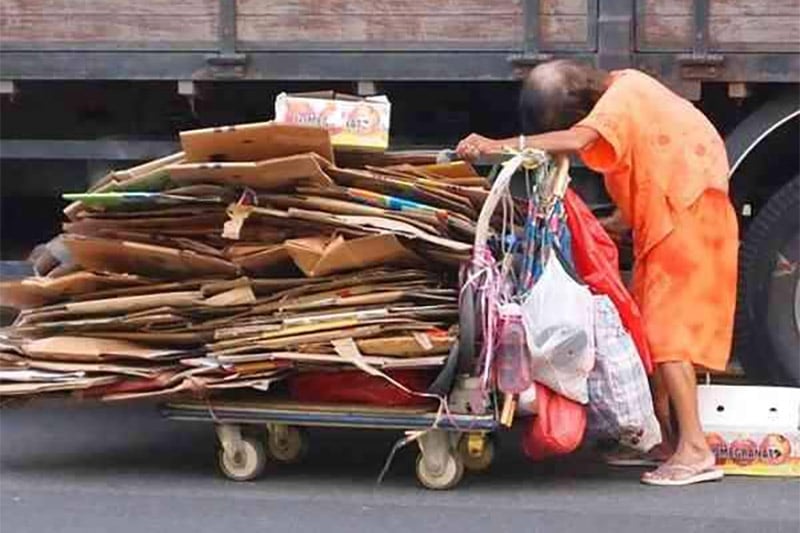
An elderly cardboard collector in Singapore. They earn only S$2 (US$1.40) for a day of menial labor[7], which is not enough to get one meal in Singapore. When you consider that Singapore is one of the richest cities in the world[8], we need to ask ourselves what has gone wrong when old people cannot retire after spending 30, 40 years for a nation’s prosperity. (Image)
Yet despite these feelings, I believe that everyone does the best they can, within the limits of their consciousness.
Many people are stuck navigating the matrices of society, hence becoming victims of the forces around them. When a country’s leaders are nonchalant about their people’s suffering, maybe it’s because it’s simply not in their consciousness to care for others. For us as citizens, it is then up to us to educate, vote for better leaders, or better still, become the leader we want to see. For people who seem uncaring about what’s going on, maybe it’s because they are struggling with issues that they can’t break out of right now.
After spending the past two years of my life feeling extremely disillusioned, I realized that disillusionment doesn’t change anything. It will only kill you as you look at the world in pain. So how do we deal with disillusionment in a positive way?
1) Recognize that disillusionment is better than ignorance
Firstly, know that disillusionment (while unpleasant) is far better than ignorance.
So you’re disillusioned because you discovered many problems in the world. This is a good thing. Because as opposed to living in an illusion, you have broken out of it. While it may feel jarring at first, this is normal as you come to terms with reality.
For me, I would much rather know the ugly truth rather than hide in a web of falsehoods. With the former, at least I know what is happening, after which I can do something about it. With the latter, I may be “happier” but I don’t know what’s going on. This was exactly what was happening before I became disillusioned. Even though I was “happier,” the issues were around me. I was happier because I didn’t know that the issues were there, not because there were no problems with the world.
By knowing the ugly truth now, it is better as I have insight into how the world and people work. Knowledge is power and knowledge will help you plan ahead. Even though change may not happen right away, awareness is the first crucial step.
2) Turn your disillusionment into action
When you first learn about the problems of this world, it’s normal to feel sad, frustrated, or even angry.
Know that anger will not change the world. Neither will sadness or apathy. You can feel angry all day long or spend your entire life feeling upset with the world, but it will not change your life in any way. It will only bring you down and make life miserable.
What you need to do is to take action. To turn your anger and disappointment into action. Ask yourself these questions:
- What exactly are you disillusioned with? Why?
- What can you do about this?
- What role can you play in the bigger picture?
For me, I believe the first step to many problems today is to raise the consciousness of people — starting with education. When someone doesn’t know what is going on, they cannot be part of the solution. Worse still, they become part of the problem as society’s default structures today lead people into low consciousness behaviors (such as materialistic behaviors like endless shopping, eating junk food, and buying things we don’t need).
Educate people through conversation and sharing your thoughts on social media. Involve your friends and colleagues in a non-intrusive discussion while respecting their views and personal space. This is infinitely more powerful than empty gossip or banter.
Let’s say you have talked to the people around you and you are ready to take things to the next level. Think about what you can do next. What can you do to drive more awareness and create change? For example, can you start a business? A blog to share what you know? A YouTube channel? A foundation to initiate change? A meetup group to engage others? An initiative where you involve others to make a difference? Or something else?
Example: Bill Gates, solving world’s poverty
All of us know Bill Gates, the co-founder of Microsoft and one of the richest men in the world. After trying to bring computers to impoverished areas of Africa in the late 1990s, he realized how ridiculous that idea was when he saw their living conditions. He said, “Hmm, which is more important, connectivity or malaria vaccine? If you think connectivity is the key thing, that’s great. I don’t.“[9]
Around that time, he visited a South African hospital for treating people with tuberculosis, after which he called his wife Melinda. She said in an interview,
“We often call each other when we are the road. Almost every day. But it was a different call. Bill was really quite choked up on the phone … Because he’d seen firsthand in a TB clinic hospital how awful it is to have that disease … He literally said to me, ‘It’s a death sentence. To go into that hospital is a death sentence.’ ” (Read: Why Bill Gates Became a Philanthropist)
Subsequently, they decided to start a foundation to enhance healthcare and reduce extreme poverty. The Bill & Melinda Gates Foundation has been going strong since 1997, had an endowment of US$44.3 billion as of 2014, and has committed billions of dollars of funding to many areas in the developing world such as infectious disease control, malaria control, HIV/AIDS control, tuberculosis control, reproductive health care, basic nutrition, among others, thereby protecting millions of children from death by preventable diseases.[10][11] As of 2007, Bill and Melinda Gates were the second-most generous philanthropists in America, having given over $28 billion to charity. They plan to eventually donate 95% of their wealth to charity.[12]
Example: Personal Excellence, helping others grow
Some of you may be thinking, I’m no Bill Gates, I don’t have the kind of money he has. I can’t make any change. Like what I shared in One Man’s Impact On The World, you can’t underestimate the power of your actions. I started Personal Excellence in 2008 with no startup capital, no contacts, no industry knowledge, and no external aid. Today PE has over one million pageviews a month, reaching out to people from over 200 countries and territories around the world.
Most importantly, it has allowed me to reach out to you. To think that our actions have no impact on others is a fallacy. We’re all interconnected in this world, more so today than ever. With the internet and globalization, our actions and purchases have a direct impact on which business thrives and fails, and whether someone can get a much-needed message that may well change their life forever.

We all live in the same world and we are already connected in more ways than one. What can you do to positively change the world into a better place? (Image)
Example: Lauren Singer, zero-waste living
Here’s another example. Lauren Singer was 21 and studying Environmental Studies at New York University when she saw the discrepancy between what she was studying and what she was doing in real life. Around her, she saw fellow students creating lots of plastic waste with single-use plastic disposables (straws, plastic bags, takeout containers, plastic fork/knife), while she herself was creating lots of plastic waste too — something that all of us are essentially doing today.
She said, “I felt like such a hypocrite. We’re supposed to be saving the planet, and here you are making all this trash.”[13]
This was when she decided to change her lifestyle and live a zero-waste life. At the age of 22 (in 2013), she started her blog Trash is for Tossers where she teaches people to live a zero-waste lifestyle. She started her YouTube channel in 2014 which has over 74,000 subscribers today, and since been profiled by CNN, BBC, MSNBC, ABC News, and AOL. The combined trash she has created over the past 4 years fits into a small mason jar, while the total trash generated by an average person in a day is easily 20 times of that! Lauren started her business The Simple Co in 2014 which makes organic, vegan cleaning products safe for your body and the environment. And she’s just 26 (as of 2017).
You can’t assume that you’re not in a position to create change. Neither can you assume that what you want to do won’t have value. No matter your age, young or old, you have the power to influence and impact others. There are people out there waiting to be influenced and it starts with you. The clock is ticking. If there’s something you can do to impact others, what would you do? What would you say to them?
3) Be empathetic to others
Along with action, comes empathy. Respecting each other as humans. Recognizing that all of us have our individual needs, fears, hopes, and dreams, and we are not soulless objects to be used. Loving each other as people.
Growing up in Singapore where its annual GDP grew by more than 14 times and its population more than doubled in the past 30 years to the point where common spaces are intensely congested[14][15], I noticed something. As a society becomes intensely urbanized, where more greenery is stripped from the land and people are filed into pigeon-hole environments to pursue never-ending material goals, I find that we begin to (a) associate less value with a human’s life and their emotions, and (b) assign more weight to objects, material wealth, and a person’s status. A nation’s relentless focus on economic growth shapes its people’s identity in more ways than you know.
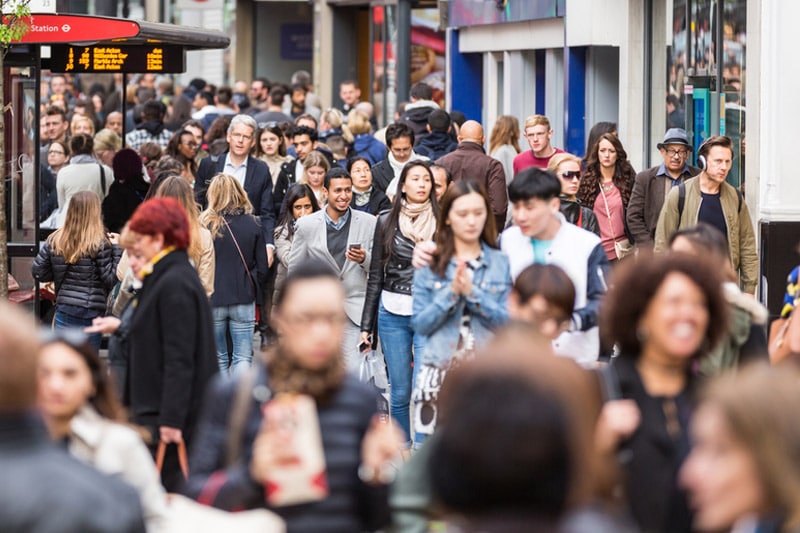
Crowded streets everywhere in over-populated cities. Depending on where you live, it’s no longer possible to have some peace and quiet to yourself, sometimes even in your own home. (Image)
As a nation pushes on with endless GDP goals, I feel that people start to lose their humanity, in the same way that I feel that the people in Japan and South Korea are losing theirs.
- At the moment, Japan and Korea have one of the highest suicide rates in the world.[16] On top of that, one of the lowest birth rates in the world (Singapore now has the lowest fertility replacement rate in the entire world as of 2017).[17] In Japan, an average of 70 Japanese people commit suicide daily. It is common for people to kill themselves by jumping in front of a train, with public train delays due to suicide (by train) a common affair.[18][19]
- Large segments of their populations have lost interest in being in a relationship, citing lack of time, economic reasons, and no interest in the opposite sex as reasons.[20][21][22][23]
- Instead, Japanese singles are turning to (a) virtual dating apps with video game characters; (b) services like cuddle cafes, host clubs, and purchasable dates; and (c) porn/erotica to fulfill individual elements of their relationship needs.[24][25][26][27][28][30] When you dissect parts of people’s life and push them to pursue material objectives independent of their personal needs, people also start to dissect their individual relationship needs and fulfill them in transactional ways.
- In Japan, there are deep social issues like child exploitation and Hikikomori where people withdraw from social life and seek extreme confinement instead, where they don’t leave their home for over 6 months.[30][31]
Individually there is nothing wrong with some of these behaviors as some people may simply prefer to live that way. But when entire segments of a population start to recluse, opt out of social and romantic relationships, or even opt to die, that’s when it’s clearly a macro-problem rather than a situation of individual choice. That’s when the leaders, especially past leaders, need to seriously reflect on what they have done with their national direction.
Aside from the above, there’s also the internet which has dehumanized interactions as we can now easily reach out to masses behind a computer screen. For some people, rudeness has become an automatic behavior as people stop appearing as real people but simply online handles with a profile pic.
The best we can do is to be empathetic first — being sensitive to others’ feelings and predicaments. Seeing people as people, not objects or tools. Showing care and concern for everyone, even if they may appear difficult. Giving a smile. Practicing emotional generosity. As we care for others, they will begin to open their hearts too.
Read:
4) Do the best you can
Last but not least, do the best you can.
For a while, I was really angry at the problems I was seeing in the world. I was angry at the fraudulent folks in my industry, misrepresenting products and causing people to run in circles with their false claims. I was angry at the social injustices in my country. I was angry at how people can be so apathetic, disinterested, or even ignorant about the issues happening before them. As someone who knows the power of media, I felt really disappointed when I saw the media being repeatedly used to spread propaganda rather than raise people’s consciousness.
But ultimately, I was really angry at myself. I felt angry for being so powerless over these issues. I felt paralyzed by the size of these problems. Around me, everyone is apathetic and disengaged, interested only in things like material purchase and self-interests, but not social issues, human rights, or world problems, which are far more important in the long run.
But after a long while of feeling angry, I realized that it’s pointless to feel this way. Even though many of the problems will likely not change in the next 10 years (and some will probably become worse become they get better), at least I can work on the things I can control first. I can work on improving my life and well-being. I can continue to pursue my mission to help others grow. I can touch those I see in my daily life. I can continue to reach out to all of you through my blog. And I can devote my efforts to those of you who can benefit from my aid.
The same goes for you. While the world isn’t perfect right now, there are many things you can do at your level. Educating yourself. Educating others. Starting a blog that rallies people into action. Starting a socially-conscious venture. Spreading empathy. These are changes that you can make at your level, among others. Do not assume that you can’t make a difference, because you can. And it all starts with you and me.
You’re not the only person feeling disillusioned with what you see in the world. There are many people who are disillusioned and working to improve things too. Many are fighting to make a change — environmental / human rights / animal rights activists, coaches, counselors, healers, doctors, scientists, socially conscious entrepreneurs, philanthropists like Bill and Melinda Gates, billionaires like Warren Buffett who has pledged to give away 99% of his wealth to philanthropic causes[32][33] along with others in The Giving Pledge.
You are not alone fighting this battle, so don’t feel that you are alone.
Freshen up. Start with what you can do first. Improve things for yourself and others around you.
When you are ready, start to really think about what you can do, at your level. No man is too small to make a change; no impact is insignificant. Think about the first change you can create. Then, the next one. Keep taking these actions, one at a time.
Individually, we may not be able to solve all the world’s issues. But together, we can make a big difference. Hopefully, by taking the maximum action at an individual level, we can positively impact others to do the same. Hopefully, by working together, you and me, we can make a difference in some people’s lives. When enough people join forces to reverse local and global issues, that’s when we’ll see the world’s problems being reversed, one at a time.
Read:

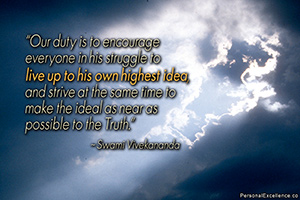
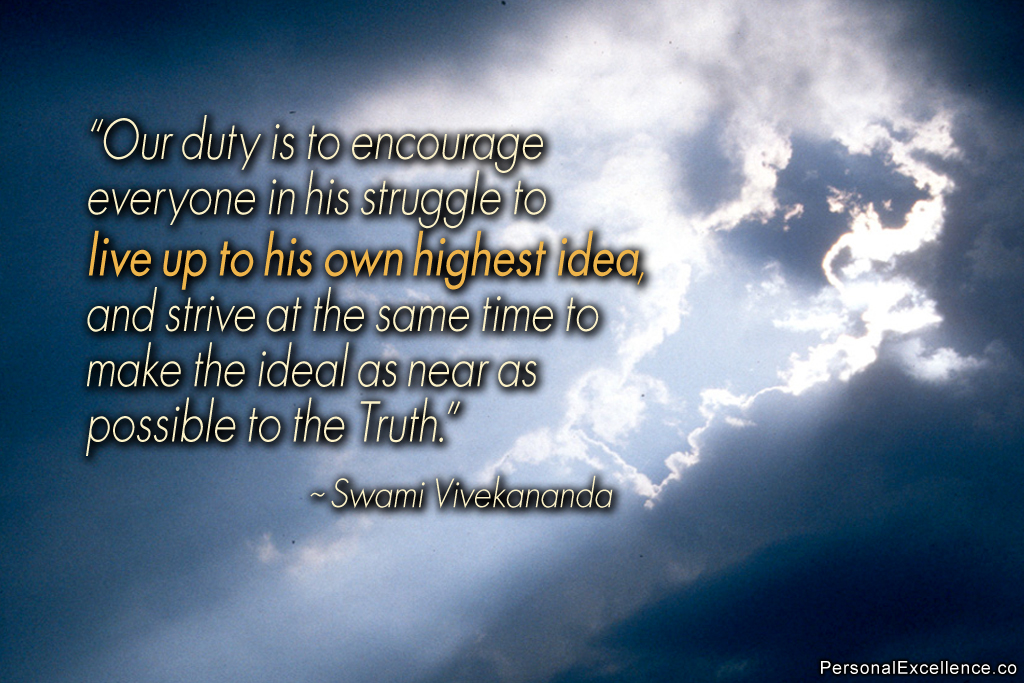




 I hope you find my content helpful. Join my community of 65,000 readers and get my latest articles delivered to your inbox. Your email is safe and I never send spam.
I hope you find my content helpful. Join my community of 65,000 readers and get my latest articles delivered to your inbox. Your email is safe and I never send spam.
Commenting for this post is closed.